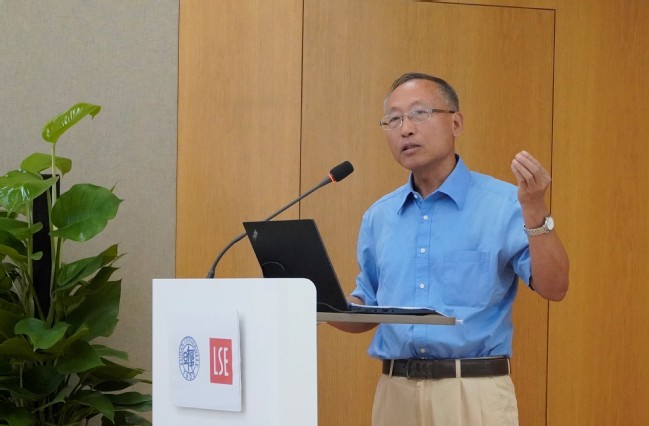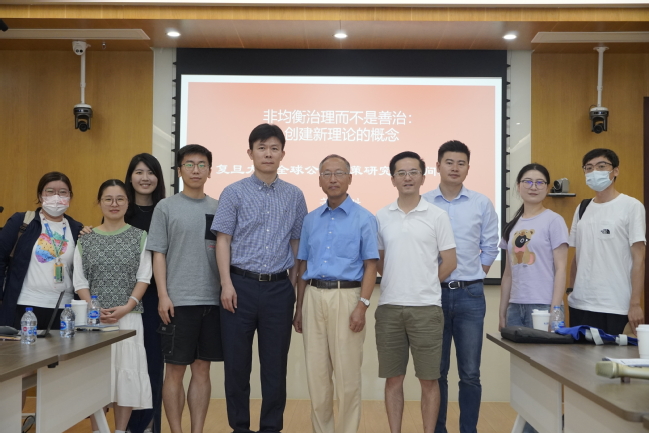Events



On June 21, 2023, the Institute for Global Public Policy (IGPP) hosted the 47th Fudan-LSE Lecture, inviting professor Lisheng Dong from University of Zurich to give a lecture titled “Unbalanced Governance rather than Good Governance: Concept for a New Theory”. The lecture was hosted by Professor Yijia Jing, Dean of IGPP.
Before the lecture, Prof. Yijia Jing briefly introduced Prof. Dong and extended sincere welcome to Prof. Dong for his visit to IGPP. Professor Lisheng Dong is a well-known Chinese expert in comparative politics and public administration. He is currently a visiting professor at the Department of Political Science of the University of Zurich, Switzerland. Professor Dong has served as a Professor of Asian Politics at Tallinn University in Estonia (August 2017-2000), a Mary Curie Professorial Research Fellow at the School of Social and Political Science at the University of Glasgow in the UK (June 2015-May 2017), and a researcher, professor, and doctoral supervisor at the Institute of Political Science and European Studies and the Graduate School of the Chinese Academy of Social Sciences (CASS)(1995-2015). Professor Dong has published 20 books in Chinese and English, and his articles have been published in Chinese top journals such as Chinese Public Administration, Political Science Research, and European Studies, as well as international academic journals such as Public Administration Review, American Review of Public Administration, International Review of Administrative Sciences, Asian Journal of Public Policy, and Contemporary China Studies.
At the beginning of the lecture, Professor Dong pointed out that in the past thirty years, the concept of governance and its associated goals have gradually been replaced by the sister concept of good governance and its lengthy list of objectives. The continuous expansion of the concept not only makes it increasingly difficult for academia and practitioners to grasp, but also, in terms of practical implementation, the concept of good governance unilaterally emphasizes the results as the best model and ignores the fact of governance imbalances and the diversity of implementation approaches, making it difficult to operate in reality.
Professor Dong outlined the governance theories that have been proposed by academia and practitioners to improve or replace the concept of good governance. While acknowledging the positive aspects of these theories, Professor Dong also believes that the proposed alternatives lack theoretical rationality and practical feasibility. Professor Dong then proposed the construction of a non-equilibrium governance theory. Inspired by Albert O. Hirschman's theory of unbalanced growth, non-equilibrium governance theory emphasizes that governance imbalances are a universal phenomenon, and improving governance requires breaking the low-level equilibrium lock-in.

Professor Dong reviewed the progress of national modernization in different fields and regions since the reform and opening up, and believed that the development path China has taken since the establishment of the New China effectively validates the non-equilibrium governance theory. At the same time, the international academic and practical communities are also reflecting on the rationality of good governance as a prerequisite for aid and loans, as well as the contradictions it brings to relevant international organizations. Finally, Professor Dong Li Sheng pointed out that future research on non-equilibrium governance theory needs to draw on interdisciplinary methods and its development will also become an attempt to construct a cross-paradigm public administration theory, promoting the localization process of public administration theory.
After the speech, Prof. Dong and the audience engaged in heated discussion on the concepts of equilibrium and balance, the conditions and mechanisms of the trickle-down effect and siphon effect in the non-equilibrium governance theory, how to choose case studies for empirical research, and the prior value of the non-equilibrium governance theory.

At the end of the lecture, Prof. Yijia Jing presented a souvenir to Prof. Dong on behalf of IGPP. The lecture ended successfully in a warm atmosphere.
